After the explosive conclusion of last week’s The Lord of the Rings: The Rings of Power, the fallout could only reposition events from the series extended prologue to the true start of its story. And that appears to be the case with episode 7 – an hour (and change) filled with unlikely character combinations, surprise revelations, and one new mystery few would have dared guess might occur. But with all of that in mind, let’s delve into “The Eye” — currently 85% on the Tomatometer with 13 reviews — to discover the changes to the lore, the possible outcomes of certain revelations, and what it means for two particular character to go missing.
Spoiler alert: The following reveals plot details for episode 7, “The Eye,” of The Lord of the Rings: The Rings of Power.
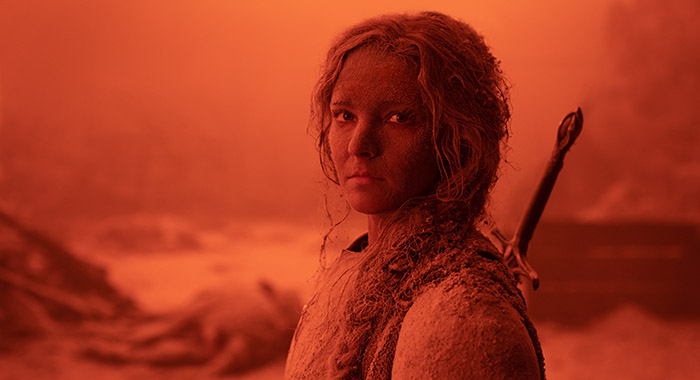
(Photo by Ben Rothstein/Prime Video)
Of all of the show’s alterations to what readers knew about Galadriel (Morfydd Clark) in the Second Age prior to the series debut, the absence of her husband, Celeborn, left fans the most puzzled. To fans of The Lord of the Rings film series (where he was played by Marton Csokas), he may not be the most pressing issue — at least until this week when Galadriel told Theo (Tyroe Muhafidin) during their unlikely team-up that he has been missing since, at least, the War of Wrath.
Per the work of J.R.R. Tolkien, Galadriel met Celeborn in the year 52 of the First Age, when Galadriel made her way to Doriath, an Elven realm in Beleriand, the part of Middle-earth destroyed and sunk at the age’s end. He was a prince of the region and soon after her arrival, the two fell in love and married. But as both are mostly absent from Tolkien’s account of the First Age, published by his son Christopher as The Silmarillion in 1977, most of their activities in the era are unknown. Indeed, Tolkien even flip-flopped on Celeborn’s origins in various reworkings of the Elder Days, recasting him as an Elf of the Undying Lands who followed Galadriel to Middle-earth when the greater part of the Noldor departed to reclaim the Silmarils from Morgoth. Christopher Tolkien’s editorial decisions may have established Celeborn as Sindarin, but the inconsistencies continued with one tale suggesting the couple ventured east prior to the end of the First Age, while others saw them remaining in Beleriand through the bitter end. The latter account may be the more canonical one as Celeborn’s distrust of Dwarves is aid to be inspired by one of their tribes sacking Doriath in 502 of the First Age.
Galadriel and Celeborn’s whereabouts in the Second Age are also up for debate. They reappear — with their daughter Celebrían — in Eregion as the friendship between the Elves settled there and the Dwarves of Khazad-Dûm begins. Of course, Celeborn’s memories of the Dwarves in Beleriand prevented him from fostering that amity himself.
But if we take Galadriel at her word — and remember, we doubt just about every story a character on Rings of Power tells another — things are very different in this telling of the tale. Celeborn has been missing for, potentially, 500 years.
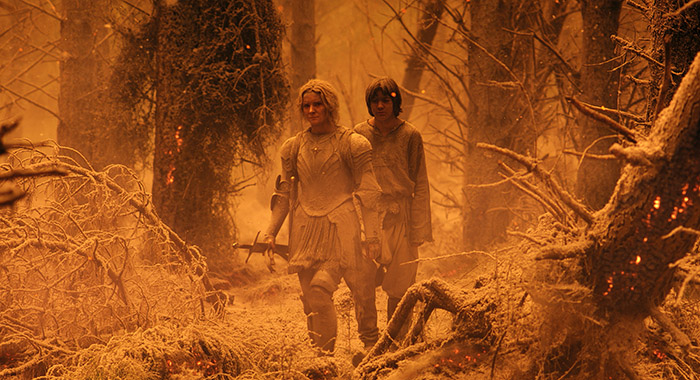
(Photo by Prime Video)
As with so much of the couple’s history, Galadriel’s account to Theo is imprecise. She mentions seeing her husband off to the war, but as the confrontation between the Elves and Morgoth took centuries — even its last battle, the War of Wrath, was a 42-year campaign — it is hard to tell which part of “the war” she is referring to. But even with we assume he did not get involved until that last part of the conflict (sometime after Doriath was completely destroyed), then he has still been gone at least 200 years. Sure, those centuries are perceived differently among the Elves, but as presented in the scene, Galadriel must assume his body was swept away in the waters which took Beleriand under the sea at the war’s conclusion. To her, he is dead.
Meanwhile, we know he’s alive. He has to be to fulfill his role in The Lord of the Rings. So, we have a new question to ponder: Where has he been all this time? Granted, that question presumes Rings of Power is unwilling to break canon in such a dramatic way. Which leads to another: Would the showrunners be willing to do something so drastic to the lore as kill Celeborn?
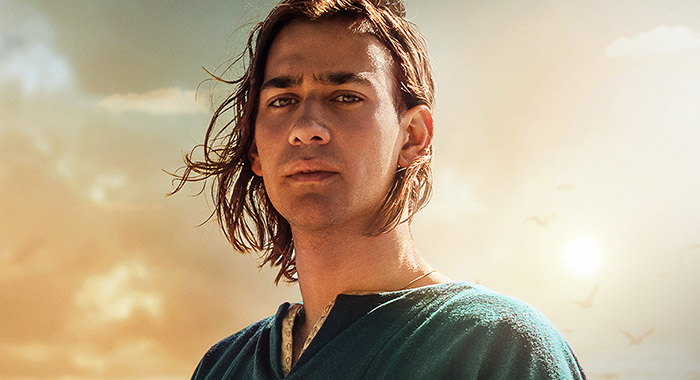
(Photo by Prime Video)
The question of whether the showrunners might kill of major characters could also be posed when considering Isildur’s (Maxim Baldry) whereabouts after the roof falls on him early in the episode. While his depiction as a directionless lad of some privilege shocked fans, was it all a ruse to put a different Man in his place as the eventual king of Gondor?
To an extent, we doubt a primetime-soap-style move is in the cards, but we’re also unwilling to discount it entirely. A switcheroo could happen at some point to keep the show in line with later lore, and that could be exciting in some ways and absolutely terrifying in others.
Meanwhile, all that business about riders bonding with their horses last episode and the unwillingness of Isildur’s horse, Berek, to be tamed this week also speaks to Isildur’s continued status as among the living. Also, we can’t help but notice a certain symmetry with Aragorn and his bond with a horse called Brego in the film version of The Two Towers. As with the fiery scene in this episode, Aragorn (played in the film by Viggo Mortensen) falls off a cliff in a sequence meant to inspire suspense – well, at least to those unfamiliar with the books. Some fans found the film’s attempt to play at his death a flat note. It is also quickly disproven when Brego finds him along a riverbank and brings him back to the Helm’s Deep.
And it certainly feels like all the work with Berek on Rings of Power — right down to the horse’s similar name — is meant to generate a similar story beat. But for a viewers familiar with the lore (or the film series’ prologue), Isildur’s fate is known and secure. Unless, of course, the show takes a bold swing in killing him off and, for reasons, replacing him with someone who assumes his identity.
The again, it sure looks like the Orcs found him in that final scene announcing the Southlands as Mordor.
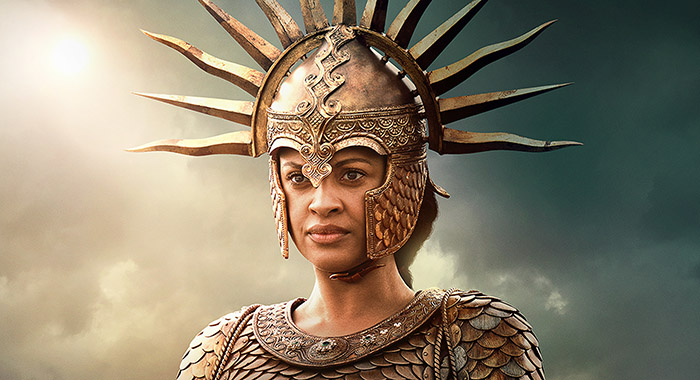
(Photo by Prime Video)
One change the show did feel empowered to make, though, was the blinding of Queen Regent Míriel (Cynthia Addai-Robinson). As written by Tolkien, her ability to see is meaningful in one crucial moment, but there is something dramatically satisfying in the show’s choice to remove her sight. For one: the name of her father, Tar-Palantir (Ken Blackburn), means “he who looks afar.” To lose her vision after he warned that only darkness awaited her in Middle-earth is good dramatic irony.
We also imagine it will allow some future events to occur which are only ever sketched in Tolkien’s account of the years to come in a similarly satisfying way. Provided, of course, her sight is permanently lost. While ending up in darkness has that ironic satisfaction, it is also clear that her sight is not darkened, but grayed. She literally asks Elendil (Lloyd Owen) if they have escaped the Mount Doom ash cloud at one point, suggesting that she at least still has a sensitivity to light and, perhaps, a way back to seeing.
Nevertheless, her vision is clear in one respect: Numenor needs to concern itself with Middle-earth. It may not be the conclusion Elendil wants to hear or the one viewers might expect after the shattering defeat Míriel experienced in the Southlands, but it is, perhaps, a fate making itself known to her. In previous episodes, the series suggested the island nation was content to stand alone far from the worries of “low men,” Dwarves, and Elves. We now know this was not always the case as the survivors of Tirharad will make for an old Númenórean settlement called Pelargir. We can also surmise from Míriel’s renewed dedication to Middle-earth that those old outposts will be reclaimed, renewed, and reinforced as a bulwark against the tide of evil.
We also expect that this was the outcome Pharazôn (Trystan Gravelle) hoped for, which also suggests Míriel’s blindness may be more than a physical affliction. But perhaps we’ll see some of that come to fruition in next week’s season finale.
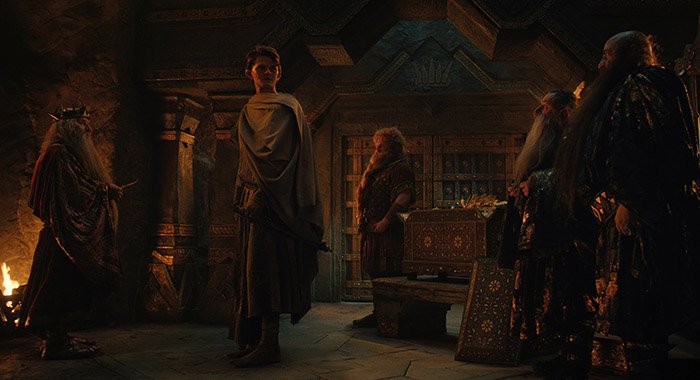
(Photo by Prime Video)
From its second episode, The Rings of Power‘s best asset has been the friendship between Elrond (Robert Aramayo) and Prince Durin (Owain Arthur). In the beginning, we called it unexpected, but it subsequent weeks, it often felt like the true heart of the show – a tale of brothers separated by circumstances of kin, blood, and societies. This notion came into sharp relief this week as the pair presented their mithril plan to King Durin III (Peter Mullan). His refusal of the proposal led Durin to (more or less) renounce his birthright before the king even had a chance to take it from him. Siding with an Elf in such a vociferous and unambiguous way is unprecedented. We’re not even sure Gimli ever spoke of Legolas in such terms or with such passion in either the Rings novels or films.
Granted, none of that moved the king, who even saw the effect the mithril had on the Lindon leaf before tossing it into mine. We suspect he may know about the other danger hidden in the dark: the Balrog of Morgoth lurking at the roots of the mountain. Nothing in the king’s behavior indicates that besides his resolute decision to keep the mind shut and the leaf’s passage into the Balrog’s place of slumber, though, so perhaps it is just the stubbornness Durin calls out in their shouting match.
From the lore perspective, the Balrog will eventually gain the title “Durin’s Bane” from his encounter with a subsequent Durin many generations after Durin III’s reign. Or, at least, we assume this is the same Balrog and not another agent of Sauron’s moving key people into position to realize his ultimate aim of achieving order in the seen and unseen realms of Middle-earth. For our characters in Kazad-Dûm, though, the king’s persistence and anger unleashes an new sort of grief … one that may continue to impact relations between the Elves and Durin’s Folk even if Celebrimbor (Charles Edwards) and Elrond manage to forge a close friendship with them alongside the Rings of Power.
Also, while we previously suggested Durin III (or the prince) might face Durin’s Bane, we now wonder if one or both will end up with a portion of the Rings ultimately gifted to their race.
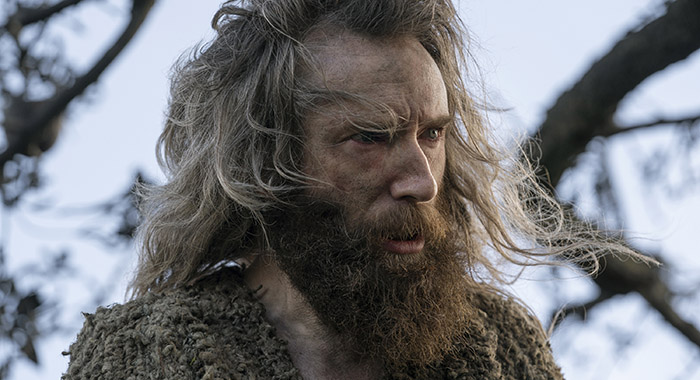
(Photo by Prime Video)
Any mention of Sauron these days naturally leads to the Stranger (Daniel Weyman). Although, the events of Episode 7 leave us even more in doubt that the meteor man is the missing Dark Lord. Case in point: the behavior of the three travelers seeking him out. Despite their white vestments, they betray an aura of ill intent — or to put it Hobbit terms, they look fair, but seem foul. And if that wasn’t enough, the callous destruction of the Harfoot carts definitely demonstrates their propensity for cruelty.
Their true nature is still unknown, though, although Amazon credits them as the Dweller (Bridie Sisson), the Nomad (Edith Poor) and the Ascetic (Kali Kopae). One guess: they may be Balrogs in human guise. Recall the Balrogs are Maiar, the same order of being as Sauron and the Five Wizards of the Third Age. They would be able to change their forms in an attempt to use slightly more subtle means to find the Stranger. But would Balrogs remain loyal to Sauron at this point? While he may have been Morgoth’s chief lieutenant, ambitions among the other fallen Maiar could lead to some power struggles. Alternatively, they may be also be more of the broken Elves who gave rise to the Orcs, just less mangled than Adar (Joseph Mawle) and more inclined to find the Stranger on Sauron’s behalf or for their own ends. The season finale trailer released during New York Comic Con certainly suggests they may be attuned with the Unseen World and are working toward the Dark Lord’s return.
Meanwhile, the Stranger continues to leave behind contradictory evidence to his identity. His destructive capability is without question, but his attempt to coax those dead trees ruined by Mount Doom’s eruption back to life is ultimately successful. It suggests a deeper connection to the underpinnings of Middle-earth that leads back to the Stranger being a Maia. But who? It is possible he is in the service of Yavanna, the Vala most concerned with growing things and the creator of the Two Trees. She is also obtusely referenced by the Harfoots in connection with the Stranger’s potential to heal the trees.
As it happens, one of Yavanna’s Maiar would spend a lot of time in Middle-earth during the Third Age and the Stranger could be an early attempt on his part to care for the growing things in the wide world. In Valinor, he is known as Aiwendil, but he will come to be known as Radagast. Like the Blue Wizards, little is recorded of his adventures and his bumbling could be evidence of the eventual Brown Wizard’s disregard for the affairs of Men and Elves. Or that could be another dodge and, as we suggested previously, he could be an heretofore unknown Maia.
One other thought: he could also be the power of Sauron detached from his consciousness and will to dominate. A consequence of Adar’s supposed confrontation with him sometime ago. Reforging the Dark Lord into one consciousness could also be the purpose behind the need for mithril, the haste in constructing Celebrimbor’s forge, and other events in motion around Middle-earth, including what we now know to be the founding of Mordor. The forging of the Rings, though teased in the NYCC finale trailer, may be a secondary concern for Sauron, who may yet need to become whole before he can manipulate Celebrimbor and the Elves of Eregion into the next phase of his plans for conquest of the world.
Speaking of the NYCC trailer, although it is mostly comprised of scenes and quotes from previous episodes, a few moments did stand out. Galadriel, now dressed in green, appears to reunite with Elrond at 1:32. A wider shot at 1:49 sees horses riding toward what appears to be Eregion’s capital, Ost-in-Edhil. Presumably, Galadriel and a handful of the other characters will make their way there in an attempt to warn the Elves about Mordor and Sauron. Combined with a moment suggesting Celebrimbor may be ready to forge a Ring — and the fact so many of the characters are already in the area — it is possible the city will be the site of Sauron making himself known — at least in one form or another. And, who knows, maybe Galadriel will discover her long-lost husband at the same time.
![]() 84%
The Lord of the Rings: The Rings of Power: Season 1
(2022)
finale streams Friday, October 14 on Prime Video.
84%
The Lord of the Rings: The Rings of Power: Season 1
(2022)
finale streams Friday, October 14 on Prime Video.